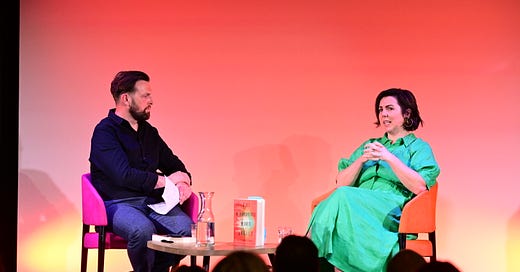I’m writing this in a cafe in Cairns, coming off the back of a splendid and busy week of festivals. I’m tired and buzzy and looking forward to getting home but also swimming in all of the ideas and energy and excitement of the past little while. I’ve written about my approach to How to Festival before and it’s enough here to say that my time at Adelaide Writers Week (where my friend Maggie Mackellar and I hung out to celebrate that our books had been longlisted for the 2024 Stella Prize!!!), at Words Out West in Dalby and at Cairns Tropical Writers Festival was so much fun and included all the things I love about festival time (and some, including a packet of chips for dinner in a late night airport lounge, that I don’t).
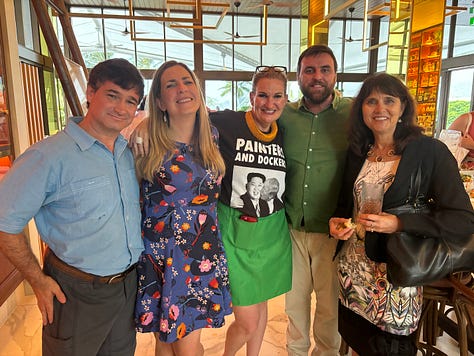
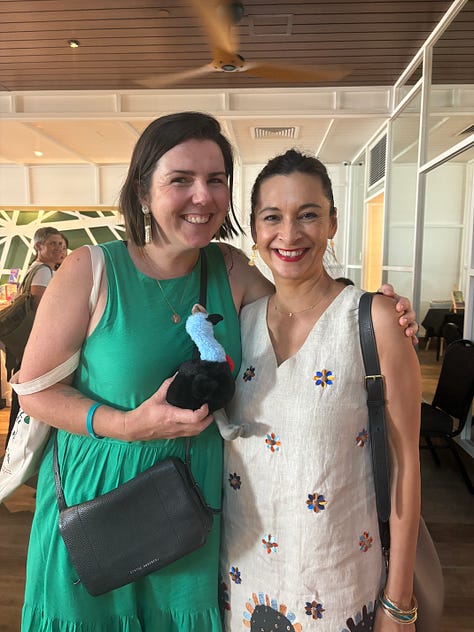
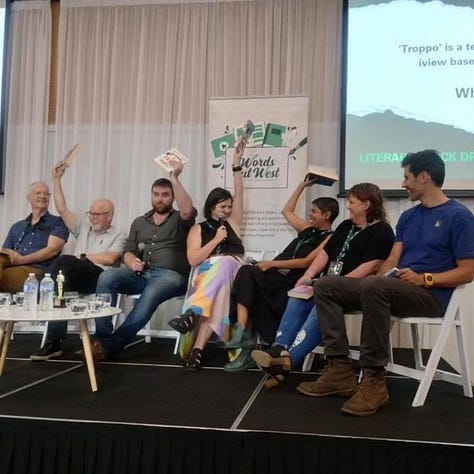
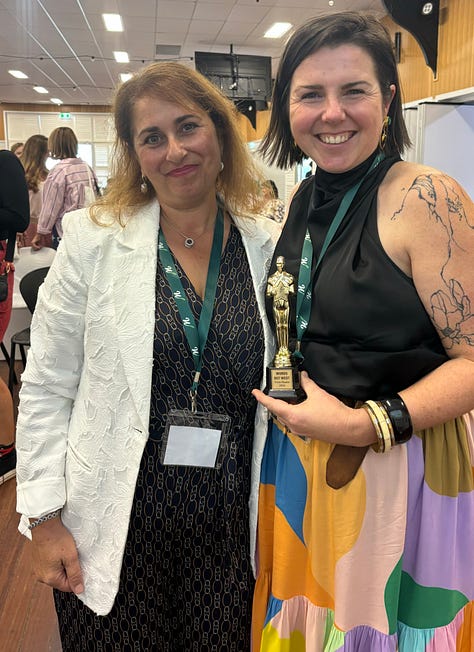
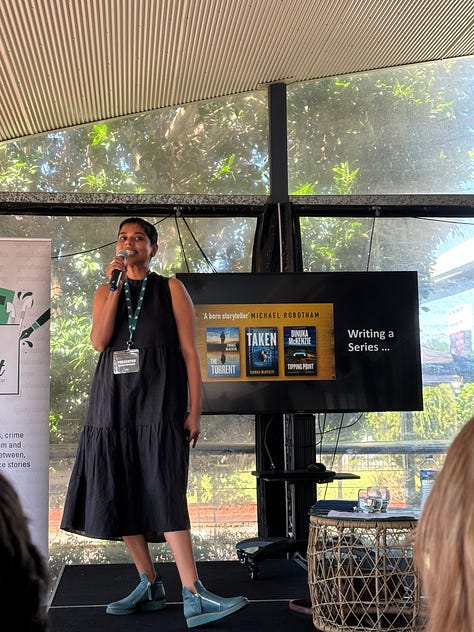
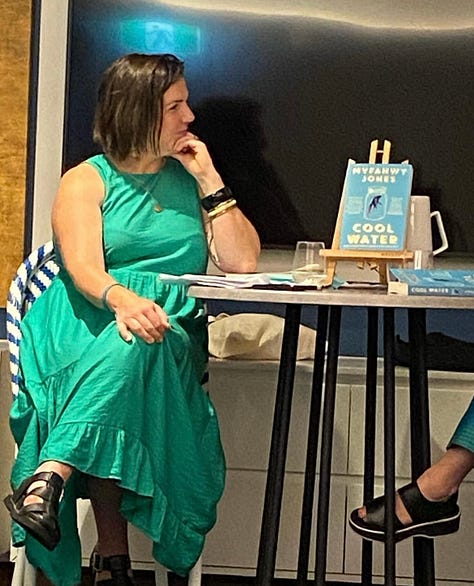
Why me? Why this? Why now?
I was both a guest and a host at these festivals and got along to loads of events so I spent a bit of time thinking (and talking) about how to feel confident talking about creative projects.
This deep dive, includes some of the key ideas I explore in my Talking the Talk workshop which I’ve run online, in person, for small groups and large groups, over the past couple of years. I’ve not had space to run the workshop since my last book came out, and probably won’t again this year but I am offering a personalised one hour online Talking the Talk workshop as part of the OzKidLit4Kids auction to fundraise for children in Gaza. There are SO many incredible donations from the kid lit community including mentorships, illustrations, manuscript assessments, book packs, school visits and more. The auction - organised by the amazing Karen Ginnane and Zewlan Moor - runs until Saturday March 16 with all funds donated to established charities providing support for children in Gaza.
I’ve learnt A LOT about doing the talking part of the writing gig since my first book came out. It helps that I’m an ex-drama teacher and an extrovert, but there are lots of strategies I’ve learned along the way - particularly through The First Time podcast - that mean I feel qualified to try and spout some helpful wisdom in this area (also, people tell me these strategies and the workshop have really helped them :)).
The key aims of the workshop are to give participants strategies to:
•Be able to speak about their project confidently & concisely
•Feel confident creating event opportunities
•Have strategies for interviews as guest and host
•Know how to broaden and work with their creative community
So, if I think about this post as a relatively long elevator ride - here are some of the key ideas I reckon are most helpful.
Practice your pitch
Knowing your project is not the same as talking about your project. You’re deep in it, you know your themes, your characters, your plot, you may have been working on it for months or years, the whole project lives and breathes in your head, and yet, someone asks you what you’re working on and you freeze.
‘Oh it’s kind of this thing…’
‘It’s nothing really…’
‘I don’t really know what I’m doing…’
It’s like we are programmed to self-sabotage in these moments. To diminish, mask, shrink - both ourselves and our project. Instead we need to learn how to ‘big ourselves up’. To give our project the respect it deserves.
Whether you are pitching a new project to an agent or publisher, or pitching your upcoming book to booksellers or potential readers, you’ll need;
a one-liner
an ‘elevator pitch’ (1-2 mins max)
some follow up points if the person you’re chatting with wants to know more.
Here are some tips for practicing the pitch for your project:
Look at IMDB, experiment with describing your project as a movie and practice pitching it as a one liner
Read catalogues/book promos/publisher websites: get familiar with the language and form of book pitches. Try them on for size.
Fake it til you make it: use every opportunity to say what your work is about and refine your pitch
If you’ve shared your work already, ask a reader or friend to describe your project back to you. Others are generally far better at ‘bigging’ you up than you are!
Check out Amie Kaufman talking about how to pitch in this podcast
The story behind you and your project
Whether you are pitching a project in its early stages or talking about something already released in the world, you’ll be asked about the story of you and your project and not just the project itself.
This can be stressful for some creatives; particularly if your project is deeply personal. Remember; you can decide what you will or will not talk about. Be clear with publishers, publicists and interviewers about anything that is off-limits that you don’t want
Many debut writers (and I was one of these!) feel so grateful and lucky to be published that they can end up feeling obliged to spill their guts on all aspects of their lives. You don’t have to do this (if you don’t want to!). Spend some time thinking about what boundaries you want to put in place around aspects of your life and story.
Prepare some anecdotes and answers around the following ideas:
What’s the book about? Think plot, character and theme with the intent of making people want to read it! If your project has a mystery or reveal, think about how to discuss it without spoilers
Where did the idea come from? What was the very first seed for this story? How long has it been with you? How did you MAKE the thing you MADE? Readers and other writers love to hear about process, habits and rituals, failures and creative strategies
What stories can you share about the inspiration for your project? What research did you do (people love hearing stories of the yacht trip I did from Darwin to Ambon, for instance)? Where there any big setbacks along the way and how did you deal with them? (Listen to How to Fail with Elizabeth Day as a way to frame these setbacks)
Who or what helped along the way? In the same way that other writers love reading acknowledgements, they love hearing about the people or orgs who helped you. It’s useful, plus you get a chance to shout out to the work of these people.
What has been your path to creating this project? If relevant, what was your path to publication?
What were the highlights, challenges, things you learned along the way, advice you received or now share?
Recommend other books and creative projects! What books inspired you? What have you been reading and loving? Are there other books or creative projects being released at the same time as yours you can shout out to?
Keep reading with a 7-day free trial
Subscribe to The Bowerbird to keep reading this post and get 7 days of free access to the full post archives.

